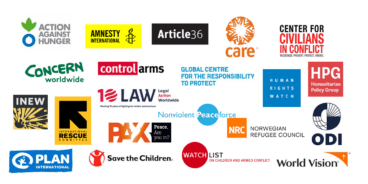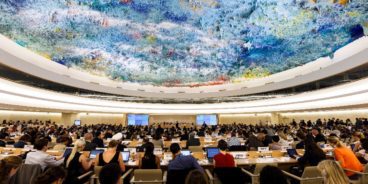
Open Letter to President Obama on the Presidential Study Directive 10
Dear President Obama,
We write to congratulate you and your Administration on the recent release of Presidential Study Directive 10. As members of the Prevention and Protection Working Group, we welcome your personal commitment to these issues and are committed to supporting implementation of PSD-10 in whatever ways we can.
We commend you for stating clearly in PSD-10 that the prevention of genocide and other mass atrocities is a national priority of U.S. policy and a core moral responsibility of this country. We were pleased to see PSD-10 begin implementation of S. Con. Res. 71 and take up recommendations of the Genocide Prevention Task Force. For too long, the international community has pledged “never again” but has not invested in the necessary policies, tools and strategies to avert mass violence and prevent the conditions that can lead to it. The policy articulated in PSD-10 and the creation of a standing interagency Atrocities Prevention Board are crucial steps towards developing these missing capacities.
As a coalition that has dedicated itself to working toward the goals of PSD-10 for the past three years, we offer the following recommendations for the 100-day interagency study:
-
-
- Make Congressional Engagement a Priority: Bipartisan support for atrocities prevention exists in both the House and the Senate, but that leadership has often felt disconnected from the Administration’s efforts. We encourage you to engage with Congress as you develop the Atrocities Prevention Board and to articulate the cost-saving benefits of investing in preventive capacities. We stand ready to work with you toward this end.
- Examine Flexible Funding: Complicated crises require timely policy responses matched with flexible funding. Providing flexible funding for civilian agencies was a specific and central recommendation of the Genocide Prevention Task Force. We urge the interagency study to examine the impact of civilian-led flexible funding streams, such as the Complex Crises Fund, thus far and highlight the importance of these streams for future atrocity prevention efforts.
- Integrate QDDR Recommendations: In 2010, the State Department elevated conflict-prevention policies and operations and included mass atrocities prevention in the QDDR. We urge the study to assess how the QDDR and PSD-10 can reinforce each other. New structures and processes must be coordinated and avoid fueling interagency tension or create confusion. Clear coordination, leadership and processes from the outset will be necessary so that new structures complement rather than compete.
- Improve Rule of Law and Civilian Security: Effective judicial and security sector reform requires an integrated approach that builds or strengthens infrastructure to prevent conflict and protect civilians as part of broader governance initiatives. The interagency study should build upon this framework and ensure links to overarching atrocity prevention policy goals.
- Support Multilateral Conflict Prevention, Peacekeeping, and Peacebuilding Capacities: Countries, international organizations, and NGOs all play an important role in defusing potentially catastrophic situations. Strengthening multilateral peacekeeping operations and making them more effective at protecting civilians and reducing the risk of mass atrocities multiplies the efficacy of U.S. actions and reduces financial costs to the United States. We encourage the study to institutionalize multilateral approaches into atrocities prevention policies, including assisting foreign governments in their efforts to create national focal points and other aspects of their early warning and response architecture.
- Strengthen Foreign Service Officers Training: According to the 2011 Failed States Index, 35 countries merit “alert” classification, the highest level of vulnerability for collapse or conflict. Government officials operating in these environments must be equipped with specific skills through conflict prevention trainings. The QDDR, PSD-10, and 2011 Senate State Authorization bill all recognize the need for conflict prevention and resolution training. We urge the interagency study to consider how best to improve and expand training within current budgets and to articulate to appropriators how such training is a worthy investment in any fiscal environment.
- Consult Civil Society Organizations: Currently, no institutional mechanisms exist for including civil society organizations in conflict assessment and policy planning. Indigenous civil society experts possess significant skills and knowledge, and clear processes for including them must be developed to ensure that conflict assessments are more accurate and programming more effective in addressing the root causes of instability. We encourage your administration to engage with the peacebuilding community as it undertakes its work. Many organizations in our Prevention and Protection Working Group are leaders in the peacebuilding field and can serve as resources for you.
-
We again congratulate you and your Administration on the release of PSD-10. As the Atrocities Prevention Board is assembled and begins work, we stand ready to work with this new body to ensure that timely action and policy responses contribute to preventing mass atrocities around the world.
Sincerely,
- 3P Human Security
- Alliance for Peacebuilding
- American Jewish World Service
- Auschwitz Institute for Peace and Reconciliation
- Better World Campaign
- Citizens for Global Solutions
- Campaign for Innocent Victims in Conflict (CIVIC)
- Church of the Brethren
- Commission on Social Action of Reform Judaism
- Enough Project
- Friends Committee on National Legislation
- Global Centre for the Responsibility to Protect
- International Crisis Group
- International Rescue Committee
- Jewish World Watch
- Joan B. Kroc Institute for Peace & Justice, University of San Diego
- Humanity United
- Human Rights First
- Maryknoll Office for Global Concerns
- Refugees International
- Resolve
- Save Darfur Coalition/Genocide Intervention Network
- Sisters of Mercy of the Americas
- Stanley Foundation
- Student Peace Alliance
- United Methodist Church, General Board of Church and Society
Related Content


2024 Statement by members of the NGO Working Group on the Protection of Civilians
